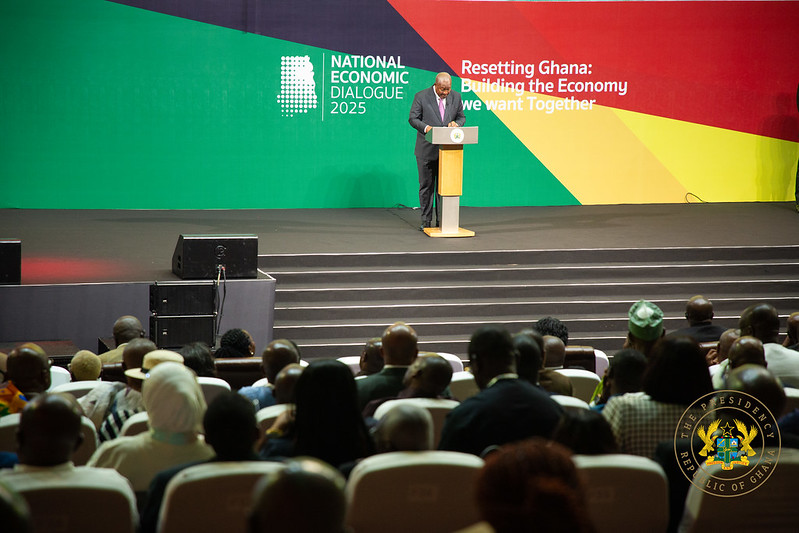The founding president of IMANI Africa, Franklin Cudjoe, has issued a stark warning about Ghana’s governance crisis, describing the country’s repeated fiscal mismanagement as “playing with hellfire.”
Speaking at the National Economic Dialogue in Accra on Monday, he questioned whether Ghana has learned anything from past economic failures or if the nation is doomed to repeat the mistakes that led to previous economic collapses.
“For three decades now, the 4th Republic of Ghana has skirted economic disaster due to weak fiscal controls and poor public financial management,” he said.
“Even more harrowing to note is that the collapse of each of the previous republics was preceded by an economic crisis.”
Mr Cudjoe lambasted the government’s tendency to create endless bureaucratic schemes, all of which, he argued, have failed to curb corruption and waste.
“From PAMSCAD to PURFMAP, from BPEMS to GIFMIS, Ghana can count itself as a contender in any contest of chefs when it comes to cooking new schemes with fancy acronyms to tame the monster,” he remarked.
“Someone quipped recently that the only acronym we have yet to try is BOFROT.”
The fundamental problem, according to Cudjoe, is that governance in Ghana has become murky, with excessive bureaucratic controls making accountability even more elusive.
“The more we pile on the controls, the more confusing, complex, and overwhelming the bureaucratic machine becomes,” he noted.
“This has the perverse effect of making governance actually more captive to the specialists in the public service who manage it.”
He linked this governance failure to what he termed the “Principal-Agent problem,” where the interests of government officials (agents) do not align with those of the citizens (principals).
“Agents look out for themselves and use their superior understanding of the system to siphon off resources for their own benefit,” he explained.
“In response, principals pile on checks and controls in a bid to contain the discretion and freedom of action of the agents. Unfortunately, sometimes the checks become unwieldy and overbearing, serving as cover for murkier, dirtier dealings.”
Read also: The governance albatross in public financial management: Time to consider the stewardship model?
Franklin Cudjoe argued that Ghana’s governance crisis is not just about corruption but about incentives.
“Extrinsic motivation—such as better salaries and perks—is difficult to implement because of our payroll situation,” he said.
“We need to focus more on intrinsic motivation: encouraging a deeper sense of pride in public service and fostering ethical leadership.”
As an alternative, he proposed a stewardship model that prioritises transparency, citizen engagement, and long-term national vision over bureaucratic entrenchment.
He warned that if Ghana continues with its current governance model, the country will perpetually hover on the edge of financial collapse.
“Deep down in your heart, you know the current approach to safeguarding the public purse in Ghana has to change radically,” Mr Cudjoe said in his closing remarks.
“We cannot continue as before.”
DISCLAIMER: The Views, Comments, Opinions, Contributions and Statements made by Readers and Contributors on this platform do not necessarily represent the views or policy of Multimedia Group Limited.

